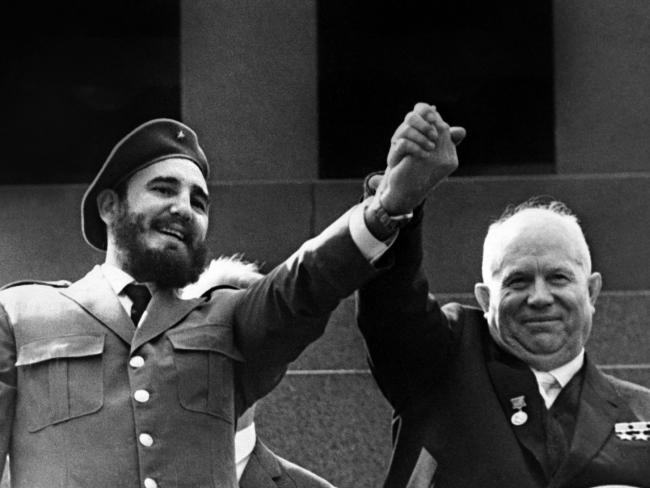Two Key Elements to Trump's Presidential Win1:45

Donald Trump's stunning victory over Hillary Clinton was aided by two key factors: voters' desire for change and the lack of enthusiasm from Obama's 2008 coalition. WSJ's Gerald F. Seib explains. Photo: AP

Donald Trump’s incredible victory stunned the world. Picture: Jim Watson
IT WAS the election outcome most of us didn’t see coming.
Leading into the US election, the majority of polls and political experts predicted Hillary Clinton would become the 45th President of the United States.
But while Ms Clinton won the popular vote, it was her rival Republican nominee Donald Trump who actually won the race to the White House in a victory which shocked the world.
Mr Trump will be sworn in as president on January 20.
A Reuters/Ipsos States of the Nation project poll taken just before the election showed Ms Clinton had a 90 per cent chance of winning the race to the White House.
The survey also showed Ms Clinton leading her rival by 45 per cent to 42 per cent in the popular vote and predicted she would win 303 votes in the Electoral College, compared to Mr Trump’s 235.
Candidates must secure 270 Electoral College votes to secure victory. Mr Trump has hit that number and then some.
In fact, according to Nate Silver, statistician and editor-in-chief of FiveThirtyEight, Mr Trump is expected to win 306 Electoral College votes compared to Ms Clinton’s 232.
But Mr Trump’s so-called impossible victory isn’t the first, and probably won’t be the last time a prediction turned out so wrong.
Here are some other political predictions which didn’t come true.

US Democratic presidential candidate Hillary Clinton pictured during her concession speech in New York on November 9. Picture: Jewel SamadSource:AFP
BREXIT SHOCK
The world let out collective gasps in June after the UK voted to leave the EU 52 per cent to 48 per cent.
The result came as a huge shock, and triggered massive volatility in financial markets after exit polls widely predicted a win for the remain campaign.
Then Prime Minister David Cameron resigned, paving the way for Theresa May to step in and trigger Article 50 which would begin a two-year process of leaving the EU by the end of March.
However, just days ago the High Court ruled that the referendum was advisory, not binding, and Brexit needs the approval of the British Parliament to leave the EU, casting everything into doubt all over again.

Will Britain fly alone after voting to leave the EU? Picture: Justin Tallis/AFPSource:AFP
RONALD REAGAN’S LANDSLIDE WIN
The Hollywood actor turned President stunned the world when he won a landslide victory against rival Jimmy Carter in November 1980.
Reagan, a former governor of California, made huge gains in the Southern states, which then President Carter was relying on to clinch the 270 Electoral College votes needed for victory.
The polls showed Carter with a huge lead until the final days of the campaign, when Reagan’s strong performance in the election’s only debate sparked a surge in his support.
Carter’s defeat was the first time since Franklin D Roosevelt won against Herbert Hoover in 1932 that an elected president lost a bid for re-election.
Reagan, the 40th president of the United States went on to serve two terms before leaving the White House in 1989.
Reagan, who died in 2004, became a conservative icon and helped pressure the Soviet Union to end the Cold War.

President Ronald Reagan pictured with First Lady Nancy Reagan in the White House in 1984. Picture: PhotoQuest/Getty Images)Source:Supplied
‘THE UNLOSABLE ELECTION’
In 1993, Labor leader Paul Keating pulled off the unthinkable when he secured a massive electoral victory.
A Newspoll in February of that year put the Coalition’s primary vote at 48 per cent and Labor’s at just 39.5 per cent, four weeks before Liberal leader John Hewson lost the so-called ‘unlosable election.’
Keating was largely regarded as the underdog in the campaign.
But a ruthless Keating attacked Hewson’s Fightback! policy in the lead-up to the election.
Dr Hewson’s appeal was dealt a blow by his inability to answer a not so simple question over whether GST would be applied to a birthday cake.
Mike Willesee asked him on national TV what the tax would affect asking: “If I buy a birthday cake from a cake shop and GST is in place do I pay more or less for that birthday cake?”.
Dr Hewson failed to properly explain how it worked. Keating said if Dr Hewson couldn’t explain how the policy worked then he couldn’t expect Australians to understand it.
Dr Hewson went on to lose the election, largely because of that birthday cake question.

Former Prime Minister Paul Keating won the election in 1993 which he was widely tipped to lose. Picture: Don Arnold/Getty ImagesSource:Getty Images
COMMUNISM ‘WILL RULE THE WORLD’ ... OR NOT
Soviet politicians are renowned for their colourful personalities.
And in 1956 Nikita Khrushchev swore black and blue that capitalism would die and the world would become one giant happy communist planet.
During a speech in front of Western ambassadors at the Polish embassy in Moscow, Khrushchev, warned that Communism’s defeat of capitalism was inevitable, CNBC reported.
Khrushchev, who led the Soviet Union from 1953 to 1964, assured the audience “history is on our side.”
“We will bury you.”
But by 1991 the Soviet Union was over after Mikhail Gorbachev resigned from his post as president and Boris Yeltsin was sworn in as leader of the new Russian state.

Cuba’s Fidel Castro and Soviet leader Nikita Khrushchev pictured in Moscow in 1963.Source:News Corp Australia








